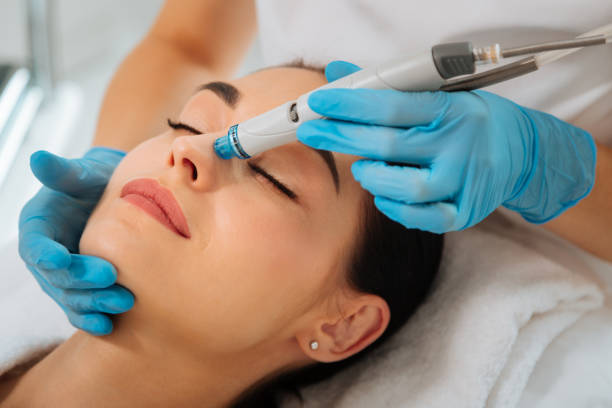Hydrafacial treatments have become a go-to for many seeking to rejuvenate their skin. Known for their ability to cleanse, exfoliate, and hydrate, Hydrafacials leave most clients with a radiant glow. But what happens when the results aren’t what you expected? If your Skin Looks Worse After Hydrafacial, don’t panic. In this guide, we’ll explore possible reasons why this may occur and, more importantly, what you can do to restore your skin to its healthy, luminous state.
Why Skin Looks Worse After Hydrafacial: Common Causes
It’s not uncommon for individuals to experience a temporary skin reaction after a Hydrafacial. Here are some possible reasons why your skin might look worse before it gets better:
1. Post-Treatment Breakouts
One of the most frequent complaints following a Hydrafacial is breakouts. While the treatment is designed to clear out pores and remove impurities, this sudden release of trapped oils and dirt can trigger acne flare-ups in some individuals.
Solution:
Breakouts are typically short-lived. To manage this, avoid picking at blemishes and opt for a gentle, non-comedogenic moisturizer. If breakouts persist, consult your dermatologist for advice on topical treatments.
2. Skin Purging
Hydrafacials accelerate the skin renewal process, which may cause purging. During purging, dead skin cells and impurities rise to the surface, leading to redness, bumps, or even pimples.
Solution:
Allow your skin time to adjust. The purging process can last anywhere from a few days to a couple of weeks. Stick to your normal skincare routine, ensuring you use products that won’t clog your pores.
3. Irritation or Sensitivity
If you have sensitive skin, the exfoliation and extraction processes involved in a Hydrafacial can sometimes leave your skin irritated. Redness, dryness, or a burning sensation may occur.
Solution:
Soothe your skin by using calming, fragrance-free products that contain ingredients like aloe vera, chamomile, or niacinamide. Avoid harsh scrubs and serums for a few days post-treatment to give your skin time to recover.
4. Over-Exfoliation
While Hydrafacials are generally gentle, over-exfoliation can happen if your skin is already compromised or if you’re using additional exfoliating products at home.
Solution:
Skip any exfoliating products in your routine for at least a week following the Hydrafacial. Instead, focus on hydration and repair with products that promote skin barrier recovery, such as hyaluronic acid and ceramide creams.
What to Do Immediately After a Hydrafacial
It’s essential to treat your skin with care after any professional facial. Here’s what you can do if your skin looks worse after a Hydrafacial:
1. Moisturize and Hydrate
Hydration is key to helping your skin recover. Hydrafacials work by infusing your skin with moisture, but you may still need to maintain hydration levels afterward, especially if your skin feels tight or dry.
Pro Tip: Use a hydrating serum containing hyaluronic acid to help lock in moisture. Follow this with a gentle, non-irritating moisturizer to create a protective barrier for your skin.
2. Avoid Direct Sunlight
Post-Hydrafacial, your skin may be more sensitive to the sun. UV exposure can aggravate any redness or irritation and delay your skin’s healing process.
Solution:
Wear a broad-spectrum sunscreen with SPF 30 or higher every day, even if you’re indoors. Hats and sunglasses also provide additional protection from harmful UV rays.
3. Skip Harsh Products
Avoid using any products that contain retinoids, acids (such as AHAs and BHAs), or harsh scrubs for at least 48-72 hours after your Hydrafacial. These can further irritate your skin and make it more prone to damage.
Pro Tip:
Stick to gentle cleansers and fragrance-free moisturizers during this time. If your skin still feels irritated, you can apply a calming facial mask with ingredients like green tea or oatmeal.
Long-Term Recovery: Restoring Your Skin’s Health
If your skin looks worse after a Hydrafacial and the symptoms don’t improve within a few days, there are several long-term recovery steps you can take.
1. Consult a Dermatologist
If breakouts, redness, or irritation persist beyond two weeks, consult a skincare professional. Your skin may require specialized care or treatments to rebalance and heal. A dermatologist can assess your skin’s condition and recommend targeted solutions, such as a customized skincare routine or in-office treatments.
2. Incorporate a Barrier Repair Cream
The skin barrier can be weakened after any intensive treatment, making it prone to irritation. Barrier repair creams help restore the skin’s natural defenses and lock in moisture.
Best Ingredients:
Look for products containing ceramides, niacinamide, and peptides. These ingredients work to strengthen the skin’s barrier and soothe inflammation.
3. Use Anti-Inflammatory Products
If your skin remains red or inflamed after your Hydrafacial, using anti-inflammatory products can help calm and soothe your complexion. Ingredients like aloe vera, green tea extract, and calendula are excellent for reducing redness and irritation.
Pro Tip:
Avoid heavy oils or greasy lotions that can clog pores. Stick to lightweight, non-comedogenic products to prevent future breakouts.
How to Prevent Negative Reactions from Future Hydrafacials
To avoid having your skin look worse after a Hydrafacial, consider the following steps before your next appointment:
1. Communicate with Your Aesthetician
Be honest with your aesthetician about your skin’s history and any past reactions to treatments. This allows them to tailor the Hydrafacial to your skin type and needs, minimizing the risk of adverse effects.
2. Opt for a Patch Test
If it’s your first time getting a Hydrafacial or you have sensitive skin, ask your aesthetician to perform a patch test. This involves applying the treatment to a small area of skin to check for any immediate reactions before proceeding with the full treatment.
3. Stick to a Gentle Pre-Treatment Routine
Avoid using any harsh exfoliants or active ingredients like retinol or vitamin C in the week leading up to your Hydrafacial. Prepping your skin by being gentle can help prevent irritation during and after the procedure.
4. Space Out Treatments
Although Hydrafacials can be done monthly, spacing out treatments can prevent over-exfoliation and allow your skin time to recover. Work with your aesthetician to establish a treatment schedule that best suits your skin’s needs.
Conclusion: Managing Skin That Looks Worse After a Hydrafacial
It’s not uncommon for your skin to go through a brief period of irritation, redness, or even breakouts after a Hydrafacial. However, with the right care, these side effects are typically temporary and can be managed effectively.
Remember to hydrate, protect your skin from the sun, and avoid harsh products until your skin has fully recovered. If symptoms persist, consult a dermatologist to get professional advice tailored to your skin type.
In the long run, Hydrafacials offer excellent benefits for maintaining a healthy, glowing complexion. By following these tips and addressing any initial concerns, you can ensure that your skin looks its best after every treatment.
SHAYONAM Cordless Portable Wireless Pressure Washer Gun 48V 12000mah High Pressure Water Gun for Car Wash Bike Washing Cleaning| Adjustable Nozzle and 5M Hose Pipe (Double_Battery) (Black)
₹1,699.00 (as of 21 November, 2024 18:32 GMT +05:30 - More infoProduct prices and availability are accurate as of the date/time indicated and are subject to change. Any price and availability information displayed on [relevant Amazon Site(s), as applicable] at the time of purchase will apply to the purchase of this product.)VAYA TYDBYT Lunchbox, Stainless Steel Bento Lunch Box with 3 Leakproof Compartments – Perfect for Kids, Office, and School, Color - Green
₹940.00 (as of 21 November, 2024 18:32 GMT +05:30 - More infoProduct prices and availability are accurate as of the date/time indicated and are subject to change. Any price and availability information displayed on [relevant Amazon Site(s), as applicable] at the time of purchase will apply to the purchase of this product.)Zulaxy Photo Frame Hooks for Wall Without Drilling, 10 Pack Self Adhesive Hooks for Wall Heavy Duty Strong Nail Free for Hanging Photo Frame (Hanging Hook, Transparent) Stainless Steel
₹274.00 (as of 20 November, 2024 18:31 GMT +05:30 - More infoProduct prices and availability are accurate as of the date/time indicated and are subject to change. Any price and availability information displayed on [relevant Amazon Site(s), as applicable] at the time of purchase will apply to the purchase of this product.)Qlect Portable Blender For Smoothie And Juices : Powerful 45 Watts Juicer Blender that Can Crush Ice too | Juicer Machine With 1800 Mah Rechargeable Battery-Smoothie Blender With Built In 500 ML Jar
₹699.00 (as of 21 November, 2024 18:32 GMT +05:30 - More infoProduct prices and availability are accurate as of the date/time indicated and are subject to change. Any price and availability information displayed on [relevant Amazon Site(s), as applicable] at the time of purchase will apply to the purchase of this product.)ATTRO Ultra Pro 2 Motivational 2-Liter BPA-Free Water Bottle with Leak-Proof Flip-Top Cap, Nylon Strap and Stylish Blue Color for Daily Hydration
₹199.00 (as of 21 November, 2024 18:32 GMT +05:30 - More infoProduct prices and availability are accurate as of the date/time indicated and are subject to change. Any price and availability information displayed on [relevant Amazon Site(s), as applicable] at the time of purchase will apply to the purchase of this product.)Discover more from The General Post
Subscribe to get the latest posts sent to your email.





